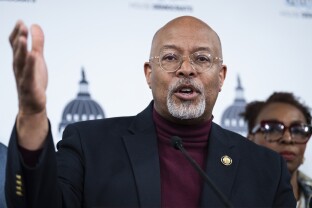The Congressional Black Caucus went from having a president’s ear under President Joe Biden to part of the minority party under a GOP ruling trifecta. But its members said they still have ways to wield their influence — and one of them is to get loud.
“When we are unable to exert our power to get legislation through, we’re still going to be noisy,” Rep. Emanuel Cleaver, one of the CBC’s most senior members, told NOTUS. “People can always count on us becoming extremely noisy when things are moving in a direction that is not healthy for the people we represent.”
As the 2026 midterms approach, the CBC’s political arm has invested a seven-figure amount on communications and organizing to reach Black voters in battleground states, a spokesperson for CBCPAC said.
CBCPAC is launching two ads on Wednesday — one for digital and the other for radio — shared beforehand with NOTUS. The digital ad mocks Trump’s viral “Black jobs” comment from the campaign trail last year and highlights how DOGE cuts affect Black workers, who make up about 20% of the federal workforce. The radio ad criticizes Trump’s economic policies and presents the CBC as well-positioned to fight against Trump.
“Our members are using every lever of influence they have to fight for all Americans and at the CBCPAC we are going to remain connected with our communities as we listen to their concerns, describe how we are fighting back, and how we will lead when Democrats regain control of Washington,” CBCPAC executive director Nicole Varner told NOTUS.
Under Biden, the CBC was one of the most powerful groups in Congress due to Rep. Jim Clyburn’s close relationship with the president. Many of Biden’s hallmark accomplishments were CBC legislative priorities such as shrinking the racial wealth gap, increasing funding to historically Black colleges and universities, and increasing economic opportunities for Black Americans.
Now, CBC members are grappling with how much power they actually have in Washington to preserve their past wins and how much they’ll rely on players outside Congress to stop Trump’s agenda. As Cleaver put it: “This is our period of frustration.”
“The power of the CBC is when we’re in the majority, really,” Rep. Glenn Ivey told NOTUS. “We don’t control any of the House, Senate or the White House.”
Within the Democratic Party, the CBC’s influence is inarguable. The most powerful Democrat in the House, Minority Leader Hakeem Jeffries, is a CBC member. The CBC currently has 61 members and makes up almost a third of the House Democratic caucus.
Rep. LaMonica McIver, a freshman member of the caucus, acknowledged that Democrats being in the minority limits the CBC’s power — “Obviously, that’s something anyone can see,” she said — but argued that the caucus remains influential because of its sheer size.
“We represent millions of Americans, Black and Brown Americans in this country. And at the end of the day, even underneath this GOP trifecta of a government, the power is still with the people,” she told NOTUS. “They still have the voices, and we represent many of those people. And I think the power is still there.”
CBC members have also been some of the most visible faces of Democratic opposition to Trump’s agenda.
Sen. Cory Booker gave the longest speech in Senate history this week to speak out against the president’s policies. During Trump’s joint address to Congress, Rep. Al Green was removed from the chamber for heckling Trump during his speech — a viral moment that resulted in his censure. CBC members have also been on the frontlines of Democratic protests at USAID , Departments of Education and Housing and Urban Development. And they have touted how they have been instrumental in building the foundation for Democrats’ opposition movement.
When NOTUS asked Rep. Troy Carter, first vice chair of the CBC, how he perceived the caucus’ power in a post-Biden era, Carter said the CBC was “just as powerful.”
“We are standing strong as the opposition to these ill-fated policies. We’re going to continue to be the conscience of the Congress, to keep in the forefront discussions of fairness and equality and push back against those things that are, in our estimation, anti-American quite frankly,” he said.
Some CBC members said outside groups could help to protect the gains made under past administrations. Cleaver pointed to leaders such as the Rev. Al Sharpton, Marc Morial of the National Urban League and organizations such as the NAACP.
CBC members are holding onto the hope that should Democrats win control of the House in the 2026 midterms, they can return to their glory days. Ivey said he hopes Democrats can successfully capitalize on the increasing backlash to Trump’s agenda.
“The Trump agenda has been so bad, especially on an economic standpoint with the tariffs and the impact on red and rural jurisdictions that I think we’ll be able to pick up those seats,” he said.
—
Tinashe Chingarande is a NOTUS reporter and an Allbritton Journalism Institute fellow.
Sign in
Log into your free account with your email. Don’t have one?
Check your email for a one-time code.
We sent a 4-digit code to . Enter the pin to confirm your account.
New code will be available in 1:00
Let’s try this again.
We encountered an error with the passcode sent to . Please reenter your email.


